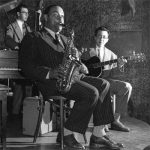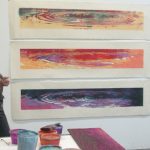Meet a NYFA Artist: Andy Teirstein
NYFA speaks with 1988 and 2008 Music Composition Fellow Andy Teirstein
NYFA: Hi Andy, Please tell us what are you working on and/or what’s coming up for you.
AT: These days I am preparing for a series of CD release events for “Open Crossings,” just released (August 25th) on Naxos. There will be a concert at Symphony Space (Leonard Nimoy Thalia Theater on 95th and Broadway) Thursday Sept 10th and one at Barnes and Noble Lincoln Center Sept 13th 3PM. The concert will feature the Cassatt Quartet, The Cygnus Ensemble, violist Danelle Farina, violinist Yuri Vodovoz, vocalist Naaz Hosseini, pianist Mill Moulton, members of the Vanaver Caravan, and actor/guitarist David Lutken with the Seat of the Pants Band. For this concert I am composing a new piece for the Cygnus Ensemble, for two electric guitars.
To nurse my hungry imagination, I am starting the composition of an opera. The libretto, a collaboration with Joseph Skibell (on whose remarkable novel it is based), has just been completed. I am writing a piece for the Cassatt Quartet, “Restless Nation,” inspired by a semester homeschooling expedition with my family last year, and a two-piano piece for child prodigies Rex and William Wei. I will also be writing some incidental music for Shakespeare’s “Julius Caesar” to be performed by prisoners at the Eastern Correctional Institute in December.
NYFA: Tell us a little bit about your process, how do you begin working on something? How do you know when a piece is ready to perform?
AT: Regardless of whether there is a collaborative scenario (a dance piece or film), my work usually begins with a fantasy involving timbres and some rhythmic impetus. I have to imagine the instruments I’m writing for. Then I look for sparks, and make pencil sketches on large manuscript paper. In the optimal scenario, I try not to interfere too much, just feeding kindling into it now and then, perhaps a thought about some pitch relationships or metrical ideas. Soon I have several little fires building. I draw circles and arrows around them and see how they might be connected. Some parts start to get formulaic and lose their heat and usually die out. When I have enough going, a sense of order descends on it, and suddenly I start laying it all out on new paper in one big bonfire. During the process, I try not to stay sitting down too long, but move around the room a little now and then to keep everything in motion. It has to be physical. The piece is ready when it is well-coo ked but still retains its initial freshness.
NYFA: Who or what is your biggest influence or inspiration right now?
AT: Having just completed a dissertation on the movement-theater works of Bartok and Milhaud, I think they are having some influence on what I’m writing. Bartok’s sense of organicism and intensity is always remarkable to me. He seems to have approached the artistic process with humility and a sense of wonder, reaching out to the anonymous music of folk cultures for inspiration. Mostly, I am still drawing on the sources that have always excited me: indigenous music of rural America, Eastern Europe, Ireland…and the imaginary circus.
NYFA: Do you collect anything?
AT: When I was growing up I used to collect animals. Finches, canaries, snakes and lizards, snapping turtles, frogs, skunks (one bought, one I caught), a monkey, and even a tarantula. Now my kids and I catch small animals and let them go. Sometimes I live-trap beavers and the big snappers. A couple of years ago a friend saved a black duckling from a Bronx butcher and gave it to us to raise over the Summer. It imprinted on us and used to ride on my back as I swam across the pond. I had no idea I could become so fond of a duck.
NYFA: What are your goals for the future?
AT: My goals are rather grandiose. You only live once. Music Theater. To change the way it happens. An all-encompassing narrative form, revitalized. This opera I am writing now will be a significant step in embracing my version of that challenge. I think peoples’ age-old need to access the power of mythology and oral traditions will soon wake them from the hypnagogic state of virtual reality, and I want to play a role in the comeback. In addition to my work as a composer and professor at NYU, I often perform as a folk musician and actor. Most recently, I was in the UK playing the roles of Pete Seeger, Arlo Guthrie and Will Geer in a new show about Woody Guthrie, called “Woody Sez,”. We’re hoping that show has a chance to find a longer-running production.
NYFA: What is an indulgence for you?
AT: If an ‘indulgence’ means something I rarely do that I feel completely obsessed with while I’m doing it, and always wish I could do more of…Sitting in a gorgeous natural setting, just listening and watching. Strange that this should have become an indulgence. But it fits the criteria perfectly. When I get it I can’t get enough of it.
NYFA: If you could transport yourself anywhere instantly, where would you go?
AT: Wanderlust is an important part of my creative toolbox, and has impelled me to some of the most enriching touchpoints of my work, like villages in the Carpathian mountains, the Cheyenne tribal grounds in Oklahoma, and the Negev in Israel. But we have a pond by our house. My son said it best… Last year, when I was on sabbatical from teaching at NYU, I took my kids out of school and my wife Olga and I did a homeschooling expedition. We bought a pop-up camper on ebay and travelled around the country, camping, hiking …By taking every gig I could, we even made it to Africa and Mexico. When we got back, my son Max said, “Ya know, Papa, the Grand Canyon was great, but its not like our pond.”
NYFA: What is one technology that you’d like to see developed?
AT: Solar Power should be developed en masse, so that it becomes affordable for everyone. It’s the way home. Otherwise, we are doomed, truly.
NYFA: Is there anything that you’d like to see addressed more adequately by artists service and funding organizations? If so, how might this issue be addressed?
AT: The fellowships for individual artists are true catalysts for new works. We need more of that, and more of the kind of programs (rare!) that foster new works by sponsorship in three-year increments. I think the arts service organizations do a lot simply to publicize the arts, to bring the sense of the arts as an important element of our national make-up, but that could also be much bigger.
NYFA: What is your workspace like?
AT: Ten years ago I realized that, more than anything else, what I craved was a good workspace, free of all distractions. I built a small cabin in the woods. No electricity. Gorgeous acoustics, lots of natural light. A table, paper, pencils….and a piano. That’s my workspace…open windows, peaceful time…where, for me, the music starts.
NYFA: What advice do you have for young artists working in your medium?
AT: To be a composer, make a lot of music. Strange as it may seem, we artists often forget that, and do all the other things instead. And most of the other things are so vapid. But they draw us away, repeatedly and continuously. Shut the door and write. Make it your first priority. You blink and ten years goes by.
NYFA: What role has the Fellowship played in your life?
AT: The Fellowship was the final funding push that allowed the CD to be recorded, especially the concerto in Kiev. And that is an enormous thing for me. It also was a supportive pat on the shoulder, encouraging me to be part of the community. I’m grateful.
For more information on Andy Teirstein, visit his website




